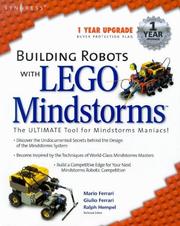| Listing 1 - 10 of 49 | << page >> |
Sort by
|
Periodical
Abstract | Keywords | Export | Availability | Bookmark
 Loading...
Loading...Choose an application
- Reference Manager
- EndNote
- RefWorks (Direct export to RefWorks)
Logic programming --- Computer programming --- Programmation logique --- Programmation (Informatique) --- Périodiques.
Periodical
Abstract | Keywords | Export | Availability | Bookmark
 Loading...
Loading...Choose an application
- Reference Manager
- EndNote
- RefWorks (Direct export to RefWorks)
Electronic digital computers --- Computer programming --- Ordinateurs --- Programmation (Informatique) --- Computer programming. --- Electronic digital computers. --- Datamaskiner --- Programmering
Periodical
ISSN: 15584593 Year: 1979 Publisher: [New York] : Association for Computing Machinery
Abstract | Keywords | Export | Availability | Bookmark
 Loading...
Loading...Choose an application
- Reference Manager
- EndNote
- RefWorks (Direct export to RefWorks)
Periodical
Abstract | Keywords | Export | Availability | Bookmark
 Loading...
Loading...Choose an application
- Reference Manager
- EndNote
- RefWorks (Direct export to RefWorks)
Algorithms --- Electronic digital computers --- Programming --- Computer programming --- Computer algorithms --- Programmation (Informatique) --- Algorithmes --- Computer algorithms. --- Computer programming. --- Algoritmen.
Periodical
ISSN: 1097024X 00380644 Year: 1971 Publisher: Chichester : John Wiley & Sons
Abstract | Keywords | Export | Availability | Bookmark
 Loading...
Loading...Choose an application
- Reference Manager
- EndNote
- RefWorks (Direct export to RefWorks)
Abstracts and full-text (PDF only), 1997- ; abstracts only, 1996.
Periodical
Abstract | Keywords | Export | Availability | Bookmark
 Loading...
Loading...Choose an application
- Reference Manager
- EndNote
- RefWorks (Direct export to RefWorks)
Computer programming --- Programmation (Informatique) --- Périodiques. --- Computer programming. --- Computers --- Electronic computer programming --- Electronic data processing --- Electronic digital computers --- Programming (Electronic computers) --- Coding theory --- Programming
Book
ISBN: 2213678723 2722602776 Year: 2013 Publisher: Collège de France
Abstract | Keywords | Export | Availability | Bookmark
 Loading...
Loading...Choose an application
- Reference Manager
- EndNote
- RefWorks (Direct export to RefWorks)
Managing time and events is central in various fields from IT, circuits and software embedded in objects of all kinds to musical creation, including the simulation of physical phenomena. This subject is however little treated by traditional data processing. This lesson presents models of time and events associated with new programming languages. It deals with the notions of thickness of the instant, of hierarchical and multiform time created by the repetition of events, and of the real time / continuous time relationship.
Electrical & Computer Engineering --- Engineering & Applied Sciences --- Electrical Engineering --- systèmes embarqués --- programmation informatique --- sciences numériques --- langages informatiques --- langage de programmation --- informatique --- temps --- synchronisation
Multi
ISBN: 9780123850812 0123850819 0123850827 9780123850829 9786613164131 6613164135 1283164132 9781283164139 Year: 2012 Publisher: Waltham, Mass. : Butterworth-Heinemann,
Abstract | Keywords | Export | Availability | Bookmark
 Loading...
Loading...Choose an application
- Reference Manager
- EndNote
- RefWorks (Direct export to RefWorks)
Assuming no knowledge of programming, this book presents both programming concepts and MATLAB's built-in functions, providing a perfect platform for exploiting MATLAB's extensive capabilities for tackling engineering problems. It starts with programming concepts such as variables, assignments, input/output, and selection statements, moves onto loops and then solves problems using both the 'programming concept' and the 'power of MATLAB' side-by-side. In-depth coverage is given to input/output, a topic that is fundamental to many engineering applications. Ancillaries available with th
Mathematics --- Computer. Automation --- Numerical analysis --- Computer programming --- Analyse numérique --- Programmation (Informatique) --- Data processing --- Informatique --- MATLAB --- Computer programming. --- Data processing. --- MATLAB.

ISBN: 128105304X 9786611053048 0080476287 9780080476285 1928994679 9781928994671 9781928994671 193226602X 9781932266023 9781281053046 Year: 2002 Publisher: Rockland, Mass. : London : Syngress Media ; International Thomson,
Abstract | Keywords | Export | Availability | Bookmark
 Loading...
Loading...Choose an application
- Reference Manager
- EndNote
- RefWorks (Direct export to RefWorks)
Lego robots! Mindstorms are sweeping the world and fans need to learn how to programme them Lego Mindstorms are a new generation of Lego Robots that can be manipulated using microcomputers, light and touch sensors, an infrared transmitter and CD-ROMs. Since Lego launched Lego Mindstorms in late 1998 sales have skyrocketed - with no sign of slowing down. Mindstorms have captured the imagination of adults and children alike, creating a subculture of Mindstorm enthusiasts around the world. The kits are now a staple part of engineering and computer science classes at many high profile Universi
LEGO toys. --- Robots --- Toys --- Automata --- Automatons --- Robotics --- Manipulators (Mechanism) --- Mecha (Vehicles) --- Design and construction --- Programming. --- Information Technology --- General and Others --- Computer programming. --- Automates --- LEGO (jouets) --- Programmation (Informatique) --- Design and construction. --- Conception et construction
Periodical
Abstract | Keywords | Export | Availability | Bookmark
 Loading...
Loading...Choose an application
- Reference Manager
- EndNote
- RefWorks (Direct export to RefWorks)
The Journal of Logic and Algebraic Programming is an international journal whose aim is to publish original research papers, survey and review articles, tutorial expositions, and historical studies in the areas of logical and algebraic methods and echniques for programming in its broadest sense. Topics of interest to the journal include : logic programming, constraint programming, abstract data types classes and objects components, process algebra and pi-calculus, term rewriting, lambda calculus, algebraic specification and verification of systems algebraic methods for syntax and semantics, applications of algebras, categories, domains, topological spaces and co-algebras to programming applications of proof theory and model theory to programming, programming with topological data types.
Logic programming --- Computer programming --- Programmation logique --- Programmation (Informatique) --- Périodiques. --- Computer programming. --- Logic programming. --- Wiskundige logica. --- Software. --- Computers --- Electronic computer programming --- Electronic data processing --- Electronic digital computers --- Programming (Electronic computers) --- Coding theory --- Programming
| Listing 1 - 10 of 49 | << page >> |
Sort by
|

 Search
Search Feedback
Feedback About UniCat
About UniCat  Help
Help News
News